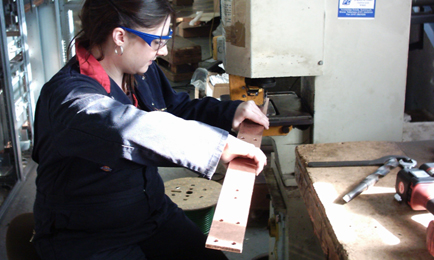Popular projects: Numbers attending the science fairs are expected to rise
The engineering diploma – one of a suite of vocational courses developed under the New Labour regime – could have been a casualty of the change of government.
In March 2011, the writing was on the wall for many vocational qualifications, which were slammed in a report by Professor Alison Wolf, an expert on education. The report argued that some diplomas and other courses had “little to no labour market value” and that, distressingly, 350,000 youngsters got little to no benefit from studying them.
Much as education secretary Michael Gove has recently argued, Wolf prescribed a focus on the core academic skills of numeracy and literacy – including the recommendation, repeated by Gove, to make students stay on to attain good grades in English and maths. Vocational courses deemed to be of no merit to schoolchildren were to be made of no merit to schools either – and not counted in league-table calculations. So schools would have no incentive to offer them.
Where did this leave the engineering diploma, which had been developed by leading institutions and employers in the hope that it might represent an important plank in combating skills shortages and introducing engineering to youngsters while at school?
The diploma survived the cull but was downgraded to being worth just one GCSE, from a level of five. This made it an unattractive qualification for schools, which would see it count less towards league-table results. And yet children would still have to devote a considerable amount of time to studying it. The end result would have been a neglected course.
For those involved in developing the diploma, such as Professor Matthew Harrison, director of engineering and education at the Royal Academy of Engineering, the relief was tangible when the government performed a volte-face. It agreed to let the parties originally tasked with developing the course come up with a new version that would fit into the post-Wolf report landscape.
“We agreed with much of the substance of the report,” says Harrison. “Alison Wolf was right that too many schools put students through low-quality, low-rigour, hardly respected qualifications to use up timetable space. Getting high grades in qualifications that are not respected by employers means nothing.”
But his argument was that the engineering diploma as originally conceived was an exception. “The engineering diploma was quite the opposite of that,” says Harrison. “It was highly respected by employers. It had got caught up in the crossfire directed at low-quality qualifications. Our aim with government was simple: we had to convince them it was the exception.”
The breakthrough came last November, when Chancellor George Osborne and the new skills minister Matthew Hancock visited Rolls-Royce’s apprenticeship facility, and announced what Harrison and colleagues in academia and industry had been pushing for – the chance to redevelop the diploma. It had already been painfully clear what the downgrading of the course to one GCSE meant, says Harrison.
“The issue was to do with where schools end up in league tables,” he says. “What happened quickly after the diploma was downgraded was that we saw a decline in the number of students taking it, because schools didn’t offer the course. You can’t blame them. They were being pragmatic, and it was a response to how they were being assessed.”
But the downgrading did not make sense in the context of the stated aims of the government on the economy, he says. “In the spring of 2011, we were in the depths of recession – there was no glimmer of an improvement. Our argument as engineers was that the country needed to return to manufacturing, making exports, and rebalancing
the economy.

Starting young: Big Bang gets students involved in science and engineering
“We had been saying for a long time ‘we can’t recruit enough engineers and technicians’. To us, removing the most promising engineering curriculum in a generation, on a technicality, simply wasn’t sensible.”
But the Treasury’s recognition of the potential of the diploma indicated that the issue of its redevelopment had become an economic one, adds Harrison. “We knew the content was right: it had been endorsed and built carefully by employers, universities and the institutions. It no longer fitted school league tables. Our view was that it should be redeveloped not by government, but by the engineers who created it in the first place,”
he says.
So the parties involved in developing the original diploma looked at it again to see how they could change it to fit in the league-table landscape without losing the essence of what they had created in the first place. For one thing, the diploma had to be reduced in size.
Importantly, two awarding bodies agreed that they would continue to offer the original diploma just as the redevelopment was taking place. So certain specialist institutions such as technical colleges, that train students carefully for certain employers and sectors and are less concerned with league-table status, could continue to offer it to students. Meanwhile, those involved in developing the revamped diploma took care to retain as much of the original content as possible, so the work that had gone into the curriculum and materials was not lost.
Another issue was ensuring that teachers could pick up the skills necessary to teach engineering, and that graduate engineers might also be attracted into teaching.
The end result of the redevelopment is a three-pronged programme that is equivalent to triple science at GCSE. Each strand can be studied on its own as the equivalent of one GCSE, requiring a double period each week or 120 hours’ study a year.
The strands are engineering design; electrical, electronic and computer control; and materials, manufacturing and maintenance. There is also a focus on sustainability and product design for mass manufacture, says Harrison.
The post-GCSE advanced-level engineering diploma is fit for purpose and does not need to be changed, he adds. “We were cross about the downgrading of the diploma and the concerns over league tables, because originally the diploma was thought of as being a bigger demand on the student than triple science – it ended up being regarded as being broadly as demanding as a single history GCSE. You’re asking a big commitment of students and teachers and giving them little recognition. It just felt wrong.”
The next step is for the redeveloped diploma to be accredited by Ofqual, which means it will count as envisaged in league-table results. Without this accreditation, it will not attract funding to be taught in state schools. Then, later this month, it should also receive the stamp of approval from government. Harrison says he is confident this will happen, given the level of support seen so far. “It would seem to be unimaginable that they would choose not to,” he says.
Another academic well aware of the benefits of a vocational approach to education is Kim Caplin, the vice-principal of Westminster Kingsway College, an inner London school that focuses on teaching 14- to 19-year-olds. Although the college does not offer the engineering diploma, it has a strong grounding in science and technology and is notable for its hosting of the regional version of the Big Bang science and engineering fair. “The vast majority of 16- to 19-year-olds at Westminster Kingsway are on vocational courses,” says Caplin.
“We find some students get pushed toward A-levels by parents and teachers, when actually what they enjoy is the more practical elements of GCSEs, such as coursework, for example. Sometimes they drop out, but we can offer them practical courses in performing arts, or engineering, or science, and they can specialise, while keeping their options open for going into higher education.”

The change of regime brought a reaction against vocational qualifications
Caplin agrees that numeracy and literacy are crucial in a vocational context. “I agree with Michael Gove that it’s important to push maths and English – too often vocational courses haven’t had those skills.” But she says that, for many students, an overly academic approach can be detrimental, and also that practical work encourages the development of other, complementary skills.
“I have a real concern with the emphasis always being placed on attaining GCSEs,” she says. “You see young people who haven’t done well and they do courses that are not necessarily practical, and they don’t see the vocational relevance of those skills.
“Under the older ‘key skills’ regime, we could make them much more vocationally relevant. Things like percentages – which might have stopped someone getting ahead for years – suddenly become relevant.
“In algebra, the same can be true – people see the relevance of it if they are doing it in a vocational science or engineering context. It can be difficult to do that with GCSEs – so that’s my concern with what’s happening with the Gove initiative at the moment.”
Westminster Kingsway College offers engineering courses that can prepare youngsters to take a degree in the engineering faculty at London’s City University. It also has an engineering course aimed at “Neets” – young people not in education, employment or training – which can provide a stepping stone back into education.
For the foundation programme for studying engineering at City University, the aim is to improve maths and physics among students who may otherwise have all the attributes needed. This year, more than 100 Westminster Kingsway students will go on to the university, whose engineering department is well regarded, says Caplin.
The college is bidding to stage the Big Bang London event for the next two years. Last summer’s event saw more than 2,000 students attend. The numbers are expected to rise, with the main national UK Young Scientists and Engineers Fair being held in Birmingham in 2014, rather than at Excel in London. Staging a London version provides an alternative for schools unable to travel to the main show.
Hosting the event would provide an opportunity for work experience for Kingsway students on vocational courses such as business and marketing or travel and tourism, who would help to put it together.
Caplin says that the college is swelling its numbers at a challenging time for the education sector. “We’ve always recruited from all the London boroughs, and we just continue to grow, at a time when London colleges are finding it tough to recruit.” Students on some of the college’s top courses, such as culinary and catering can almost be guaranteed to find work, she adds.
“What I hope for all our students is employability. That employers will select them when they are going for heavily competitive jobs. The best opportunity for employment for all our students – that’s my aim for this year,” says Caplin.
“On some of our science courses, employment rates after college are at more than 90%. It would be great if every course reaches that level.”
Meanwhile, engineers will have their fingers crossed that the redeveloped diploma will gain traction in schools across the country from next year.